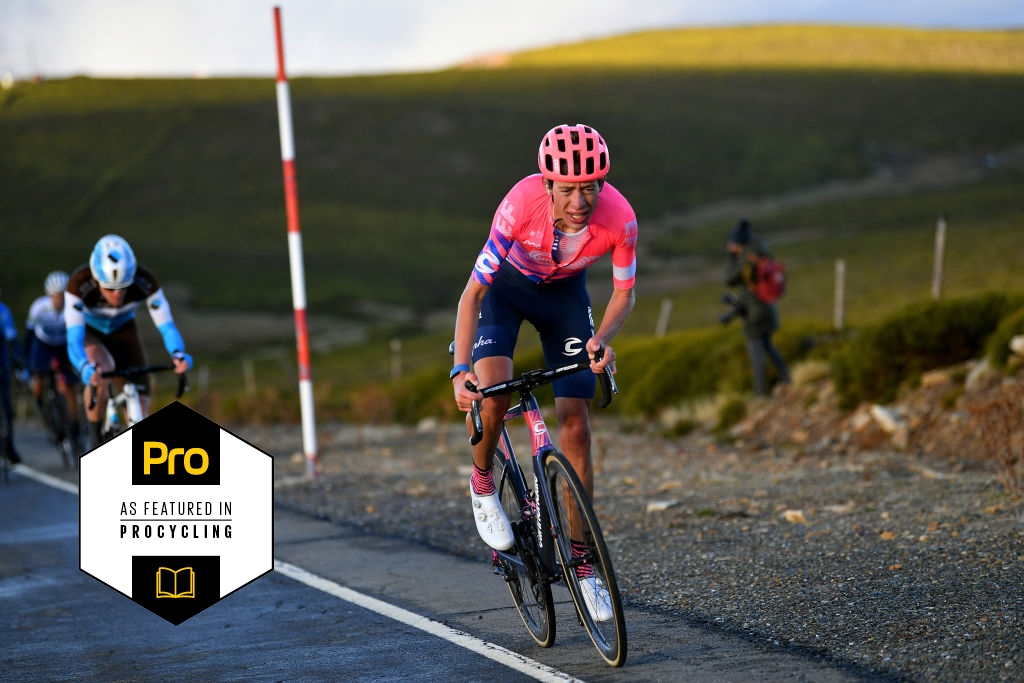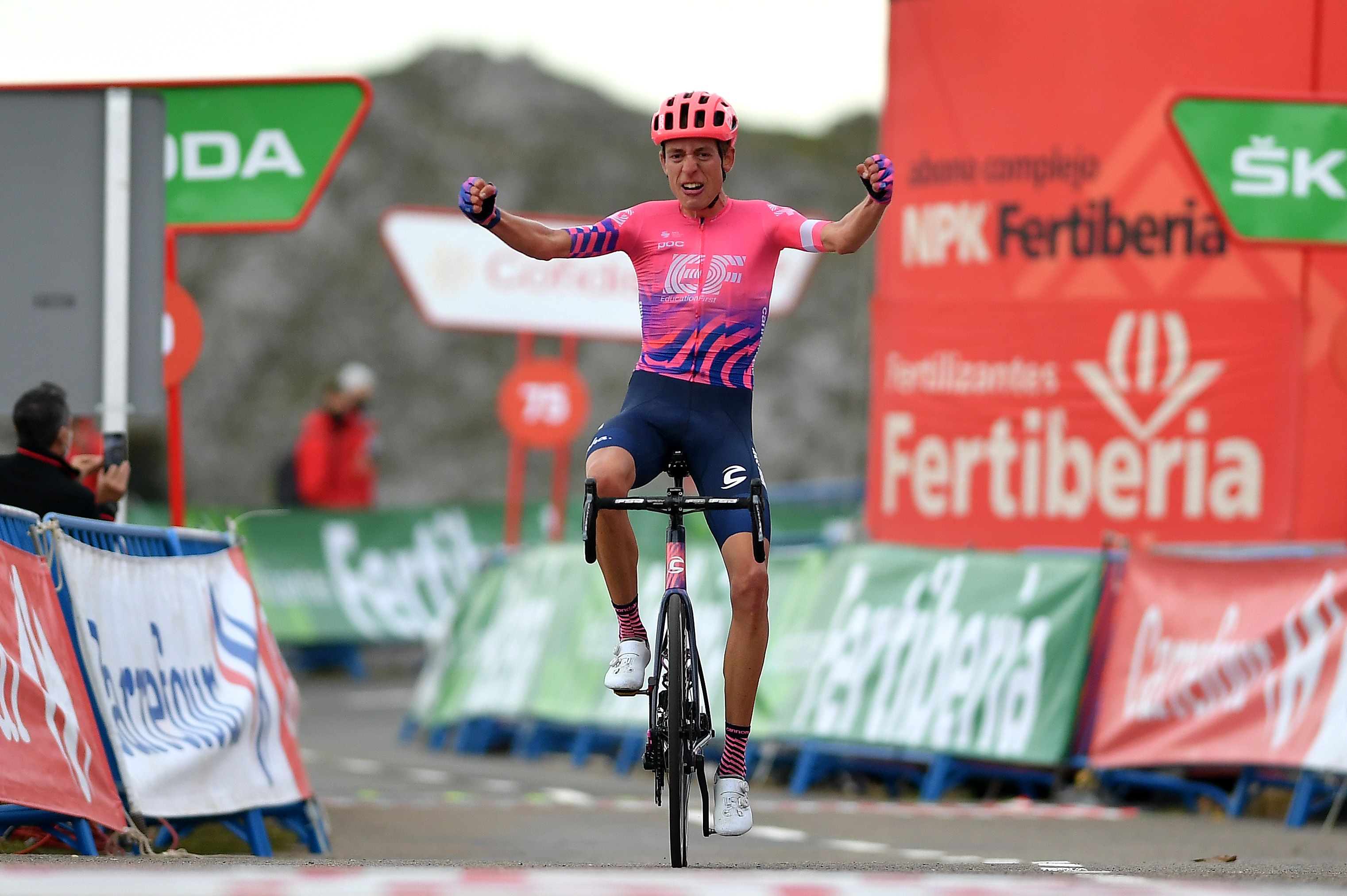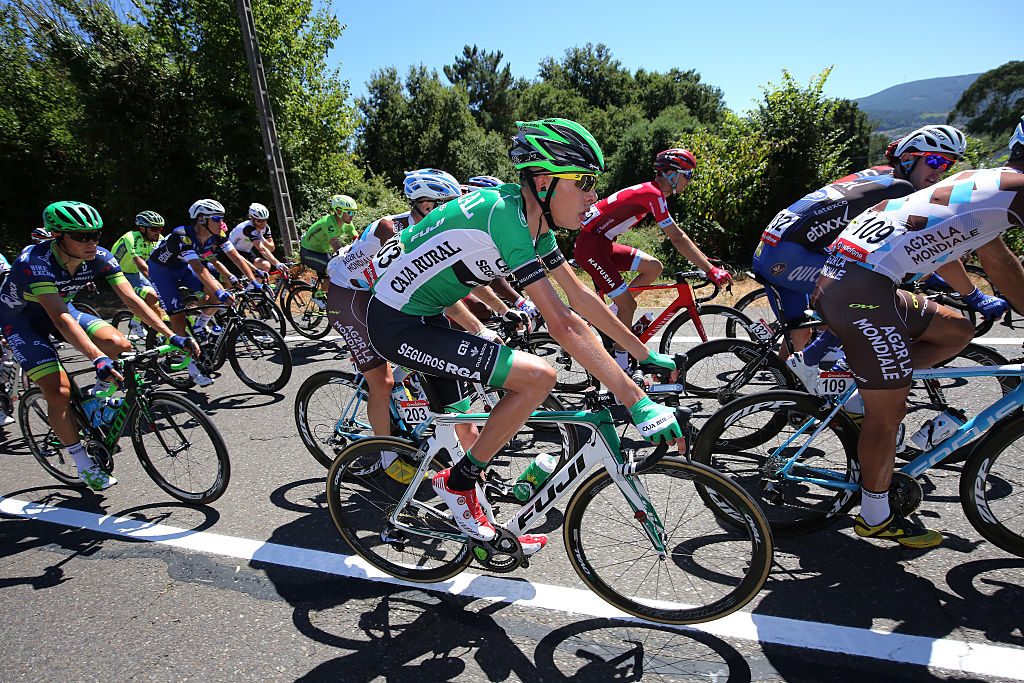Hugh Carthy: Free from distractions
Procycling magazine interviewed Vuelta breakthrough star Hugh Carthy as he prepared to join the WorldTour

At the end of 2016, Hugh Carthy was preparing to join the WorldTour with the then Cannondale (now EF Pro Cycling) team, and had carved out a life for himself in Pamplona away from Girona, the Spanish hub for Anglo-Saxon riders. Procycling went to meet him and found a young man with a strong sense of identity.
This article appeared in Procycling magazine issue 226, February 2017. Subscribe to Procycling magazine now from just £3.47 per issue
When Hugh Carthy tries to explain why he is living by himself in Pamplona, a city fully 550 kilometres from the Anglo-Saxon colony of professionals in Girona, he makes it sound very simple: he just needs his own space. In the process, he can avoid making pointless comparisons with other riders.
"If you're in a place like Girona and out shopping in the supermarket and your season is not going very well, and then you run into another pro who's having the best year of their lives, then you'll be most likely thinking to yourself: 'Ach, f***ing dick,'" he tells Procycling.
"This way, by living in Pamplona, whether your racing is going good or bad, after each race you get your head back into your own training and a private routine as soon as possible.
"You're quite isolated and that appeals to me. It's not about me trying to be different. It's more that if you're in a place like this, it's not so claustrophobic."
This sounds a lot like common sense but it's a much more unusual attitude than you may think. Witness the number of English-speaking professional riders all clustered together in Girona, for one thing - upward of four dozen - and the grand total of those living in a Spanish city like Pamplona: one. He's now aged 22 and has signed for his first WorldTour team, Cannondale-Drapac. Carthy's determination to cut his own, very individual, path has marked almost every stage of his career to date. So far, his approach has worked very well.
Get The Leadout Newsletter
The latest race content, interviews, features, reviews and expert buying guides, direct to your inbox!
In 2016, his second year in the ProConti ranks, Carthy's season highlight was finishing ninth overall and best young rider in a Volta a Catalunya crammed with GC stars of the calibre of Chris Froome, Alberto Contador, Nairo Quintana, Richie Porte and Tejay van Garderen. This was a stunning performance - he was the only non-WorldTour rider to finish in the top 10 of a WorldTour stage race all year, and though there's no such thing as a weak field in these events, Catalunya was really packed with stars. He was sandwiched between Froome in eighth and Rigoberto Urán in 10th.
Carthy also became the first Briton ever to win the Vuelta a Asturias, one of Spain's most venerable stage races, and only a last-minute crash then prevented him from finishing on the podium of the Route du Sud. On top of which, Carthy completed his first ever Grand Tour, the Vuelta a España.
All of this was achieved when racing in a very different environment to anything the young British climber had come across before. For two years, barring the fleeting presence in 2015 of US-born stagiaire Kyle Murphy, Carthy was the only English-speaking rider in Caja Rural, a longstanding ProContinental team based in Pamplona. Carthy, though, clearly wasn't daunted by that, nor at the prospect of living in Spain - a country he'd never even visited before signing for Caja Rural in 2015, let alone raced in - at a time when he did not speak a word of Spanish. The culture shock was possibly mutual, given Caja Rural had never, in their eight-year history, signed an English-speaking rider, relying mainly on Spanish riders to fill their roster.
"Initially the team had a traditional European attitude. I was very much the outsider. People weren't cold or rude to me but it took a while to build up their trust," he recalls. "Once I'd learned the language, though, that was a real turning point, people started thinking: this guy's serious, he's come to Spain on his own, he's not just messing around."

Meanwhile, Carthy has taken a real liking to Pamplona, also the hometown of Miguel Indurain and the Movistar squad and with a long-standing, rich tradition of professional cycling that is closely linked to the adjacent Basque Country. "It's nice and quiet, a bit more low key than other places and it's got a good cycling heritage. When you come to a foreign place, you need people to understand what you're doing, even if it's as simple as going to the airport. They'll say 'Okay, I'll give him a lift, I'm a cyclist myself, I'll help him out.'"
The weather, although colder than in Girona, is not too harsh. So far this winter he's only trained once in the wet - for somebody who was born and raised in rain-soaked Preston in the UK, that's a real luxury. The Pyrenees are just a little too far to reach without driving but Carthy can still pedal his way out from his home in the Pamplona suburbs to some big hills in northern Navarre or train on the much flatter plains on the region's southern side. At the same time, Carthy has learned to live abroad, by himself. But he's adamant that has not been as steep a learning curve as some might think."Maybe I don't see it because I'm trapped in it, but I don't use social media so people don't see into my life and they may think he must be all alone, locked in his room and having a miserable f***ing time."
In fact, Carthy has built up a solid social life in the city, with friends in and outside cycling. "If I'm bored, I'll come to this kind of place," he says. He's talking to Procycling in a friendly, homely restaurant still bearing stickers from the Banesto cycling team (a previous incarnation of Movistar) on the fusebox round the back of the bar. "I'll have a coffee and chat to the barman about cycling. I remember watching a stage of Paris-Nice here when the TV was bust back in the team house where I used to live, drinking about four coffees. Somebody else might think, 'Eh, that's rubbish, I'd like to be in a fancy café or spend my time on a Playstation' but these are the things I like doing."
Deciding to make a career of cycling was straightforward for Carthy. "I've never considered any other job because I'm sh*t at everything else," he admits brightly before remembering, "I'm good at cooking, though, I love it. Maybe I'd like to do something with that after cycling." Warming to his point but still thinking about Pamplona, he adds, "I like the food here, it's not fancy, not pretty, but it's good. It's fresh, made properly." (He's taken to the Pamplona diet so much that he says one of his cupboards is crammed full of the small china pots in which cuajada - a delicious northern Spanish dessert, vaguely similar to a sugar-free yoghurt - is sold.) "There's no messing around with their food which is good because I can't abide food chainstores or tourist traps. Places like this restaurant, we're just a few hundred metres away from the city's central tourist bubble and I've never seen anyone here but a local."
Apart from avoiding tourists while off the bike, the upshot of Carthy's taking the path less travelled towards the WorldTour was that - like Mohammed and the mountain - if Carthy didn't move to Girona, Girona had no option but to come to him. Last summer, Cannondale-Drapac, whose European base is in the Catalan city, opened up negotiations and Carthy has now signed with the American squad.
"I was very set on them from the start," he says. "I knew from February, too, that there would be guys like Tom [Southam, formerly with JLT, Carthy's team before Caja Rural and now a director at Cannondale]. Cannondale is a good team, they might not win 30 races a year but look at their directors, they were all incredibly good, experienced riders."

It was reported that Sky had made Carthy an offer for 2017 which he turned down. But Carthy says that conversations with Sky had never even got that far. "A top management guy asked if I thought I'd fit into the team and I told him I didn't think I would," he says with his characteristic directness. "That was pretty much it."
As a GC rider and climber, not to mention holding a British passport, turning down the biggest stage racing team in the world seems illogical. But Carthy, showing a healthy degree of self-awareness, argues that it currently makes no sense for him to go to Sky.
"Would you ask a 22-year-old footballer if he was ready for Manchester United?" he asks rhetorically. "Would they ever actually get to play in the Champions League or the Premier League? The chances are they wouldn't. But if you went to a club like…I don't know football but some smaller Premier League club, say, then you might get to play in the first team every week or 80 per cent of the time."
Apart from the greater opportunities in races and the good management, the way Cannondale is run appeals to him. "It's a serious team with serious riders but with up-and-coming riders as well. It's like they're making an investment in me. In Sky, normally they want riders winning races as soon as possible, or that's how I see it, anyway."
There were also some personal links with Cannondale: Charly Wegelius, one of the team's managers, was trained as an amateur by Carthy's current coach, Ken Matheson. Carthy also says he and Wegelius have been in sporadic touch throughout his Caja Rural years. "I was definitely on their radar but maybe they were waiting for a breakthrough result."
What will he miss about Caja Rural? "A lot. They had a lot of old school rules. For example, there was a total ban on mobile phones at the dinner table – if you got it out you'd get a fine. Not a lot of teams do that these days.
"I liked coming to the races as the underdog, too. You'd have prepared well, and other squads wouldn't pay that much attention until it was too late."
Even Caja Rural's downsides were relative, he says. "We didn't have the budget to be a slick operation but it was never really a problem.
"When there was no air conditioning in the rooms in the Vuelta, we didn't have machines brought into the room. We didn't have mattresses that can cool you down, chefs or a mobile kitchen. But we had a good massage, a good meal, and we'd have the best night's sleep we could.
"Everything else is a marginal gain. There's a certain point in the Grand Tour when you can have as many marginal gains as you like but you still end up having to ride a bike. Some of the bigger teams - I'm not talking specifically about Sky - they fail to focus on the bigger picture because they're looking so much at the smaller things."
After working within the confines of a smaller, low-budget squad in such unfamiliar surroundings, Carthy argues he's "more robust" but that the time had come to move on. "Say the bus breaks down on the way to a race, or you have to change things last minute about your bike. It's not so important for when things go right but it can be when things go wrong.
"Caja Rural were pissed off I wanted to go, mind, but I'm not the first person to want to leave; they shouldn't take it personally. If I'd stayed with them, I'd be going back to the same races as before, the bigger teams might lose interest and I'd maybe miss the boat."
With Caja Rural, he points out, apart from the Vuelta a España, the usual top-ranked races on the calendar are Tirreno-Adriatico, País Vasco and San Sebastián, none of which suit him, with only one - Catalunya - that really does. "That's seven days of racing, whereas with Cannondale-Drapac, potentially there's Romandie, Tour of Poland, Tour de Suisse, maybe 40 days of WorldTour racing I can specifically gear to my specialities. That's ultimately how I had to look at it: where can I progress and go to better races, more new races, and learn about them?"
Carthy is chary about revealing which of those new races he'll be doing in 2017, although he says, "There'll be a Grand Tour in there somewhere." However, he is adamant he will carry over one particular approach from his previous years. "I'm not going to start setting targets. I'm going to carry on really hard, treating all of the races as an opportunity. Focusing on one event is like putting all your eggs in one basket; you'd waste your time because you've been 40 days waiting for that one event. It's better to go to races with your race head on all the way through, and less pressure."
Probably the one event where Carthy broke his own rules and started a major race too stressed out last year was the Vuelta a España. "It all fell apart a bit. My aim was to finish but I think I was tired from a long season, psychologically too." He crashed on stage 10 to Covadonga and needed stitches in one hand. He took antibiotics for 10 days but is not prepared to see that as an excuse. "If I'd won a stage or two or led the race, I don't think a cut like that would have held me back."
Had Carthy hit the heights in the Vuelta, long-term it probably wouldn't have changed much for him anyway. "You gain confidence from results but I've never really sat back and been satisfied. There are always things I feel I could have done better, at any race, even Catalunya. I know what I can do there to improve next time."
In terms of the bigger picture as a pro, he has no regrets at taking a career path which some might view as too cut-off from the UK - this year he spent his second Christmas in Pamplona - or in which he missed out on higher education.
"I think if I'd been to university I'd be in the same sh*t as people who haven't been able to find a job and who've spent 50 or 60 grand on getting a degree and who are up to their necks in debt," Carthy argues. "Instead, I know how to pay taxes, do car insurance - boring, annoying, everyday stuff that people at university my age, maybe, don't know how to do - and I can do it in a foreign language in a country that's not my own, too.
"I think what I've gained here in the last two years I can apply to all sorts of areas in life," he concludes. But for now, it's his cycling career that is reaping the benefits and with Cannondale, he'll surely be able to move up another notch or three. Just don't ask him to move to Girona.
If you like what you read, why not subscribe to Procycling magazine? Save money on the cost of a subscription as part of our 2020 holiday offers, and never miss an issue.
Alasdair Fotheringham has been reporting on cycling since 1991. He has covered every Tour de France since 1992 bar one, as well as numerous other bike races of all shapes and sizes, ranging from the Olympic Games in 2008 to the now sadly defunct Subida a Urkiola hill climb in Spain. As well as working for Cyclingnews, he has also written for The Independent, The Guardian, ProCycling, The Express and Reuters.
